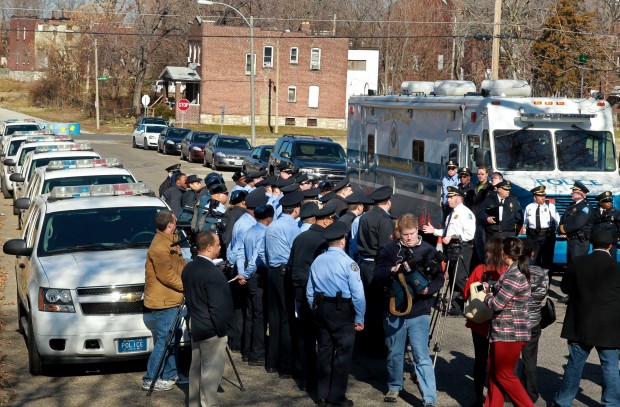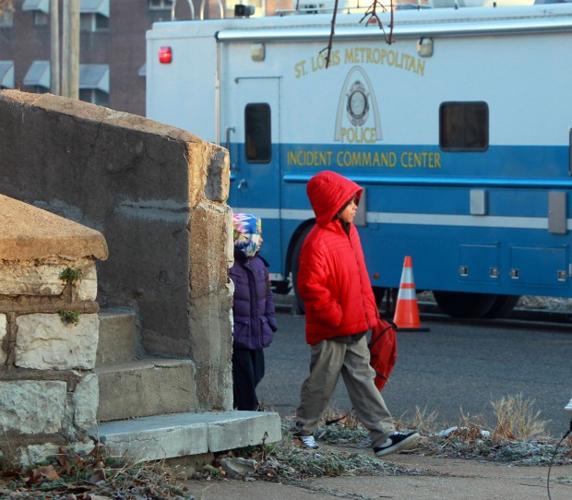ST. LOUIS ŌĆó Residents of the College Hill neighborhood, who have been waking up to news of bloodshed on their streets in recent weeks, will wake today to find a small army of police on those streets, vowing not to leave until the violence has stopped.
About 80 police officers will saturate the North Side neighborhood, along the western edge of Interstate 70 north of downtown, until further notice, officials said Tuesday. They will conduct roll call in the street, station a command vehicle on site, use dog patrols and make a door-to-door plea for help in solving shootings that left three people dead and one seriously wounded in the past two weeks.
ŌĆ£We realize people know whatŌĆÖs going on and we realize they are afraid to talk to us,ŌĆØ said police Lt. Col. Al Adkins. ŌĆ£But they have avenues to contact us and still remain anonymous. So weŌĆÖre going to run this as long as we can, to stop what we can.ŌĆØ
People are also reading…
Residents and police have said they believe the violence involves a neighborhood feud over a woman, and is not gang-related.
It represents an extension of recent police tactics to pour resources into troubled areas.
The three slayings in College Hill brought the cityŌĆÖs January total to 15, not counting two killings ruled justified. The five-year average for murders in January is about eight. Managing violence has become a front-burner issue in the upcoming mayoral election, and in this summerŌĆÖs impending transition of the police department from state control to local.
Mayor Francis Slay lauded the police intervention and said the effort would be backed up with City Hall resources, such as problem-property units and social services, as needed.
SlayŌĆÖs principal opponent in the Democratic primary, Aldermanic President Lewis Reed, has criticized the mayor for not doing enough to rein in violence. Alderman Antonio French of the 21st Ward, Reed's supporter and former campaign consultant, hosted what he called an emergency town hall meeting last weekend at the OŌĆÖFallon Park Recreation Complex to address the problems around College Hill.
French said he appreciates the police efforts there. ŌĆ£Together, with the citizens and families of College Hill, weŌĆÖre going to get through this,ŌĆØ French said. ŌĆ£And my commitment to this area will not end when the violence does ŌĆö and it will end.ŌĆØ
The neighborhood is in parts of two wards besides FrenchŌĆÖs.
Prince Carter was among the meetingŌĆÖs crowd of about 120. He has helped plan another meeting for 6:30 tonight.
ŌĆ£We want like-minded people who are fed up and concerned with issues of crime to come together for one hour on a weekly basis and come up with solutions...ŌĆØ Carter said. ŌĆ£We canŌĆÖt just do it when something happens. We need to stop being reactive and figure out ways to improve safety. IŌĆÖm tired of waiting for somebody else to save us. We need to save ourselves.ŌĆØ
Carter said he wants to form a neighborhood coalition that can pass information to police or social workers for people too afraid to do it themselves.
He said that every morning he sees children standing at a bus stop near his house, along West Florissant Avenue, while prostitutes prowl nearby. ŌĆ£Why should those babies be exposed to that?ŌĆØ he asked. ŌĆ£Once the masses of good people take a united stand against those bad elements, they will have to run away. TheyŌĆÖre in a comfort zone right now, and weŌĆÖve got to take that comfort zone away from them by exposing them.ŌĆØ
Pushing criminals out of their comfort zones is part of the police strategy, said Chief Sam Dotson. ŌĆ£Research shows that when you displace crime, you donŌĆÖt displace it at 100 percent, you displace it at about 80 percent,ŌĆØ he explained in an interview this week. ŌĆ£And IŌĆÖll take that 20 percent reduction any day.ŌĆØ
The College Hill intervention is similar to the Homicide Deterrence Initiative, begun by former Chief Dan Isom in the wake of a rise in aggravated assaults involving guns last year. A focused detachment of officers hit the streets about a month after the high-profile August murder of 51║┌┴Ž University alumna Megan Boken, shot to death while talking on her cellphone during a robbery attempt in the Central West End.
Adkins said the department had about a month to plan that strategy, but arranged College Hill in just days.
The 51║┌┴Ž Police OfficersŌĆÖ Association pushed back on IsomŌĆÖs 30-day notice to officers that their hours would change to focus on hot spots during peak crime hours, saying it was a contract violation.
The officers assigned to College Hill are members of the departmentŌĆÖs specialized units, including SWAT, Canine, Community Outreach and Traffic, Dotson said. ŌĆ£We have more flexibility in specialized units that allow their hours to change.ŌĆØ
Dotson said there is no deadline to end the push. ŌĆ£We will be there until we feel like weŌĆÖve made enough arrests and contain the violence,ŌĆØ he said.
The importance of the work was illustrated when the sound of an ambulance siren blared past CarterŌĆÖs house.
ŌĆ£Oh, Lord Jesus, please donŌĆÖt let it be another one,ŌĆØ Carter said. ŌĆ£I have to do that now. I have to pray every time I hear a siren that someone else hasnŌĆÖt been shot.ŌĆØ
Nicholas J.C. Pistor and Doug Moore of the Post-Dispatch contributed to this report.

























